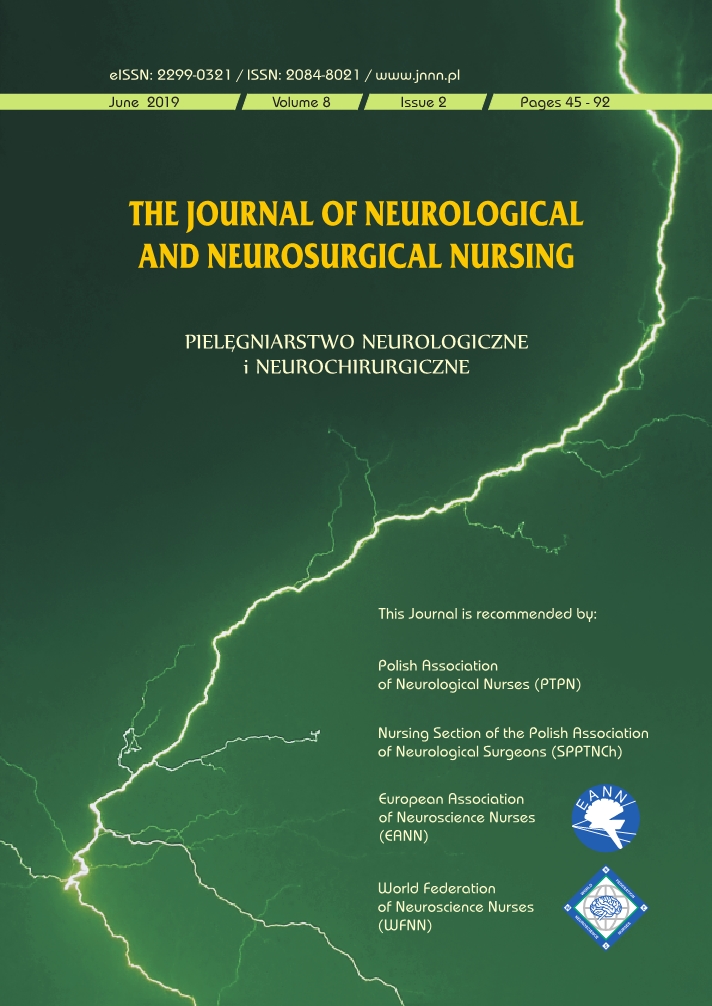Clinimetric Evaluation of Functional Capacity and Quality of Life of Stroke Patients — Study Review
DOI:
https://doi.org/10.15225/PNN.2019.8.2.6Keywords
stroke, quality of life, functional capacity, clinimetric evaluationAbstract
Stroke is the second most common cause of death in the world after ischemic heart disease and is often associated with various long-term physical and neuropsychological consequences. Because stroke is one of the most common causes of disability, interest from researchers arCNSd the world is focused on assessing the functional capacity and quality of life among these patients. Many assessment tools, covering various functional areas, are available to clinicians and researchers working with people who have had a stroke. The presented analysis of research results of various authors indicates that stroke significantly affects physical and mental performance. The change in functional abilities, mood disorders, cognitive impairment and reduced social interactions are often observed in these patients. In stroke patients, the simultaneous use of several different scales for assessing patients’ conditions creates the possibility of correct qualification for rehabilitation, long-term forecasting, estimation of needs for possible care and an objective, more detailed analysis of the obtained results and changes occurring during the treatment process. (JNNN 2019;8(2):86–90)
References
Hankey G.J. Stroke. Lancet. 2017;389(10069):641–654.
Sacco R.L., Kasner S.E., Broderick J.P. et al. An updated definition of stroke for the 21st century: a statement for healthcare professionals from the American Heart Association/American Stroke Association. Stroke. 2013;44(7):2064–2089.
Paszkiewicz-Woźniak D. Postępowanie w przypadku powikłań leczenia trombolitycznego udaru niedokrwiennego mózgu. Neurologia po Dyplomie. 2014;9(6):25–48.
Kelly P.J., Kavanagh E., Murphy S. Stroke: New Developments and Their Application in Clinical Practice. Semin Neurol. 2016;36(4):317–323.
Harrison J.K., McArthur K.S., Quinn T.J. Assessment scales in stroke: clinimetric and clinical considerations. Clin Interv Aging. 2013;8:201–211.
Ślusarz R. Skala Wydolności Funkcjonalnej (FCS) w praktyce pielęgniarskiej. Pielęg Neurol Neurochir. 2012;1(1):35–40.
Lyden P.D., Lu M., Levine S.R. et al. A modified National Institutes of Health Stroke Scale for use in stroke clinical trials: preliminary reliability and validity. Stroke. 2001;32(6):1310–1317.
Kosakowska J., Grabowska-Fudala B., Smelkowska A., Wilkiewicz M., Górna K., Jaracz K. Northwick Park Dependency Score — a New Scale for Use in Nursing Practice. J Neurol Neurosurg Nurs. 2018;7(1):4–11.
Schoemaker R., Nayak S., Harnisch L.O., Karlsson M.O. VISTA-ICH Collaboration. Modeling and simulation of the modified Rankin Scale and National Institutes of Health Stroke Scale neurological endpoints in intracerebral hemorrhage. J Pharmacokinet Pharmacodyn. 2019. doi: 10.1007/s10928-019-09653-4.
Broderick J.P., Adeoye O., Elm J. Evolution of the Modified Rankin Scale and Its Use in Future Stroke Trials. Stroke. 2017;48(7):2007–2012.
Yeoh Y.S., Koh G.C., Tan C.S. et al. Can acute clinical outcomes predict health-related quality of life after stroke: a one-year prospective study of stroke survivors. Health Qual Life Outcomes. 2018;16(1):221.
Khalid W., Rozi S., Ali T.S. et al. Quality of life after stroke in Pakistan. BMC Neurol. 2016;16(1):250.
López Espuela F., Portilla Cuenca J.C., Leno Díaz C., Párraga Sánchez J.M., Gamez-Leyva G., Casado Naranjo I. Sex differences in long-term quality of life after stroke: Influence of mood and functional status. Neurologia. 2017;S0213-4853(17)30347-X. doi: 10.1016/j.nrl.2017.10.002.
Chen Q., Cao C., Gong L., Zhang Y. Health related quality of life in stroke patients and risk factors associated with patients for return to work. Medicine (Baltimore). 2019;98(16):e15130.
Seixas A.A., Chung D.P., Richards S.L. et al. The impact of short and long sleep duration on instrumental activities of daily living among stroke survivors. Neuropsychiatr Dis Treat. 2019;15:177–182.
Rutovic S., Kadojic D., Dikanovic M., Solic K., Malojcic B. Prevalence and correlates of post-traumatic stress disorder after ischaemic stroke. Acta Neurol Belg. 2019. doi: 10.1007/s13760-019-01200-9.
Lehnerer S., Hotter B., Padberg I. et al. Social work support and unmet social needs in life after stroke: a cross-sectional exploratory study. BMC Neurol. 2019;19(1):220.
Downloads
Published
How to Cite
Issue
Section
License

This work is licensed under a Creative Commons Attribution-NoDerivatives 4.0 International License.
Stats
Number of views and downloads: 433
Number of citations: 0
